Ivermectin has generated a lot of interest lately, and the buzz has nothing to do with its historical use as an anti-parasite medication. Most of the headlines have talked about ivermectin as a remedy for COVID-19. You may have also heard that some people are taking ivermectin for its potential effects against cancer.
When you’re facing cancer, you want to have every cancer-fighting tool available to you. Among different approaches, taking an “old drug” like ivermectin is gaining importance, according to early cancer research studies.
Recent findings have revealed a multifaceted mechanism of action of ivermectin, including anti-tumor, anti-inflammatory, and other immune-related effects [1]. These mechanisms suggest that “repurposed” ivermectin may be a potentially beneficial off-label treatment for cancer [2].
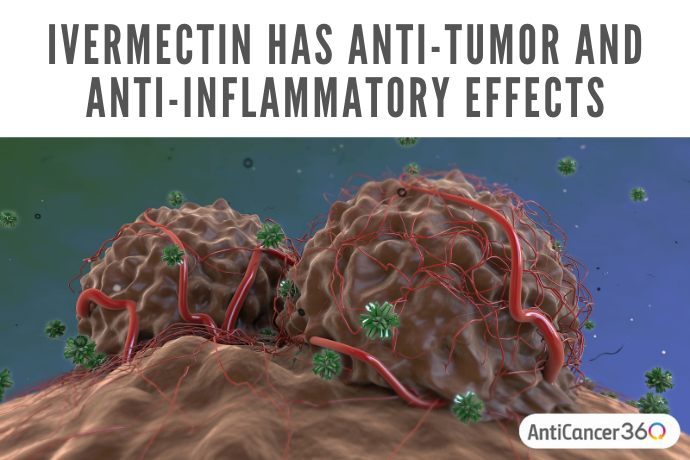
“Off-label” drug use is when a medication is prescribed for a reason other than the indications (reasons for use) listed in the drug’s official label from the Food and Drug Administration (FDA). Healthcare providers frequently prescribe medications off-label when they decide the potential benefits of treatment outweigh the risks for their patients.
So in today’s post, we’ll attempt to summarize the recent research related to ivermectin and its potential benefits for cancer. We’ll also provide answers to questions that we’re frequently asked about ivermectin, including the dosing, safety, interactions, and other information.
What is ivermectin?
Ivermectin is a medication that’s been around for decades. It belongs to a class of drugs called anthelmintics and is approved as an anti-parasite medication by the Food and Drug Administration (FDA) [3].
Ivermectin tablets (brand name: Stromectol) are typically prescribed to adults and children to treat parasite infections, such as intestinal worms [4].
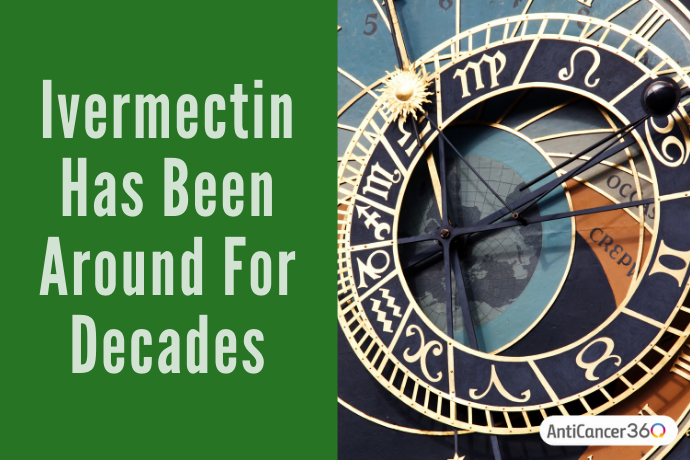
Ivermectin also comes as a cream, Soolantra, which is prescribed to treat rosacea, a skin condition [5]. Additionally, ivermectin is sold over-the-counter as Sklice, a lotion applied to the scalp to treat head lice [6].
Ivermectin is one of several antimicrobial drugs repurposed for its potential antitumor properties. Other examples are hydroxychloroquine, mebendazole, mefloquine, and niclosamide. Some of these medications kill parasites or other germs by binding to specific targets on the cell membrane, leading to death—a mechanism implicated in how they kill cancer cells. But, several different mechanisms are also likely involved.
Let’s take a closer look at ivermectin’s anti-tumor mechanisms of action.
Potential Anticancer Effects of Ivermectin
Research has shown that ivermectin may cause cancer cell death (apoptosis) due to the production of reactive oxygen species (ROS) in cell mitochondria [7]. This mechanism has been demonstrated in several studies, including studies in colorectal cancer, renal cell carcinoma (kidney cancer), and chronic myeloid leukemia [8],[9].
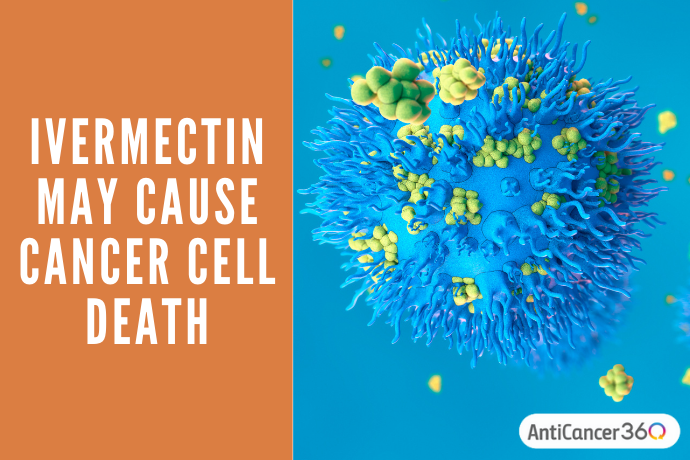
To understand this, let’s review some cell biology basics. Mitochondria are like tiny organs in a cell that function to make energy. Typically, when things like infection or lack of nutrients place stress on a cell, ROS or free radicals are produced within the cell. When ROS accumulates, the cell mitochondria become damaged and stop functioning correctly, which leads to cell death.
Ivermectin does not typically cause this damage in normal, healthy cells. This key difference is likely because cancer cells have higher-than-normal levels of mitochondrial mass to meet their ultra-high energy demands. Notoriously, cancer cells grow more rapidly than normal cells, which requires tons of energy. So, it makes sense that ivermectin’s energy-depleting actions may significantly impact cancer cells.
In a 2016 study of breast cancer cells in mice, ivermectin was shown to stop the proliferation of the cells by blocking cell signals involved with cell growth [10]. Additionally, in 2016, a study of glioblastoma (brain cancer) in mice showed that ivermectin not only stopped tumor growth but also blocked the formation of new tumor capillaries (tiny blood vessels), a process called angiogenesis [11].
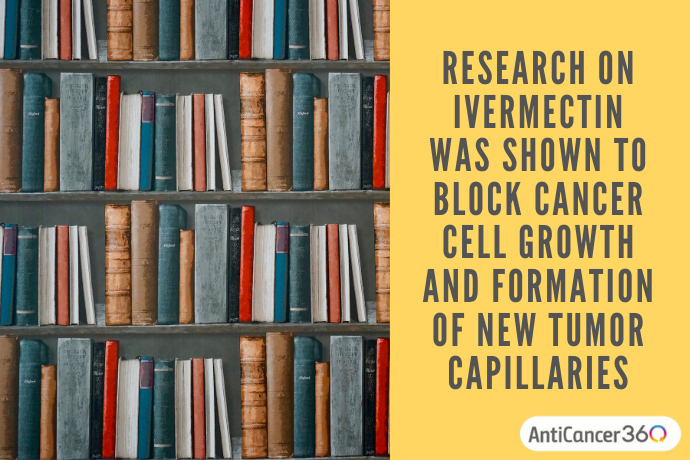
Antiparasitic drugs like ivermectin also help to regulate autophagy, a self-destructive process that plays a key role in regulating cell growth and metabolism [12]. Cell- and animal-based studies have shown autophagy-related growth suppression of various cancers, including ovarian, breast, and brain cancer cells [13].
Besides ivermectin’s effects on cancer cell growth, another important mechanism of ivermectin involves the immune system.
Ivermectin May Promote Immune-Mediated Cell Death
Ivermectin has been shown to promote immunogenic cell death. It’s a form of cell death that stimulates the body’s innate immune system cells, specifically T cells, to recognize and attack cancer. Among the evidence for this is a 2021 study that showed ivermectin’s synergism when combined with a checkpoint inhibitor drug, a type of immunotherapy used to treat cancer [14].
(Quick side note. Synergism occurs when two substances cooperate to produce a combined effect that’s greater than the sum of their separate effects when each is used alone. So, in a synergistic relationship, “one plus one equals three.” And in the context of fighting cancer, you can see how it would be beneficial to combine substances that have potentially synergistic cancer-killing action.)
Back to the details of this study… which, keep in mind, is considered “early data.” It was performed in a lab using test tubes and cancer cells grafted into mice (not in humans).
In this study, researchers used ivermectin with anti-PD1, a monoclonal antibody drug, classified as a checkpoint inhibitor, to treat triple-negative breast cancer cells. Anti-PD1 is mainly effective against “hot tumors,” which are tumors that contain high numbers of T cells. The drug has little activity against “cold tumors,” which have little to zero T cells [15].
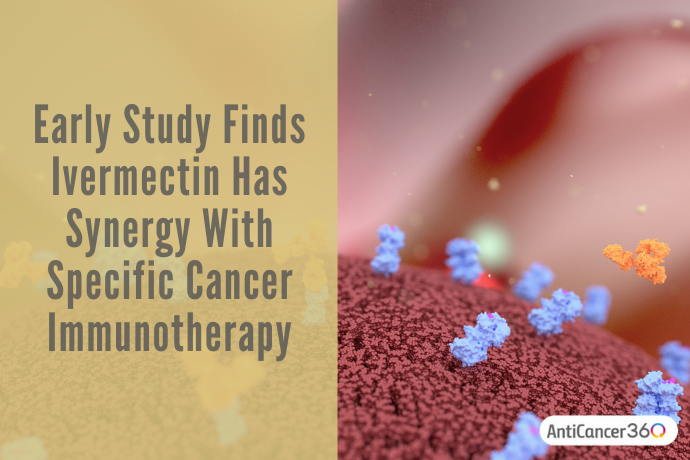
Interestingly, this study found that ivermectin turned “cold tumors” into “hot tumors.” This enabled the anti-PD1 drug to work more effectively.
In an interview for the City of Hope, the study’s lead investigator Dr. Peter Lee explained that this study was the first time this synergistic effect was observed. He stated that either drug alone has minimal impact, but together they can be powerful [16].
The results revealed complete tumor regression (disappearance) in 6 out of 15 mice that received the combination treatment. For comparison, the same results were seen in 1 out of 20 mice given ivermectin alone, 1 out of 10 given the anti-PD1 drug alone, and zero out of 25 mice given no treatment [17]. Similarly, the study also showed encouraging results in mice models of metastatic cancer, in which cancer has spread beyond the breast, and in mice who already had surgical removal of the tumor.
Clinical trial research is necessary to learn about the effects of ivermectin in humans with cancer.
Frequently Asked Questions about Ivermectin: Dosages, Side Effects, and Precautions
Next, we’ll answer some FAQs about ivermectin. Unless otherwise cited, the answers below are sourced from ivermectin’s FDA-approved drug labeling [18].
Can ivermectin cure cancer?
Unfortunately, there’s no proof that ivermectin cures cancer.
But, there’s promising evidence from preclinical studies (lab-based studies of human cancer cells or mice) that demonstrates ivermectin’s anticancer effects in [19]:
- Breast cancer (including triple-negative breast cancer)
- Leukemia
- Ovarian cancer
- Glioblastoma (a type of brain cancer)
- Cervical cancer
- Gastric cancer
- Melanoma (a form of skin cancer)
- Colon cancer
What dosage of ivermectin should I take for cancer?
Stromectol (ivermectin) tablets are available in one strength: 3 milligrams (mg).
Ivermectin dosing is typically based on a person’s body weight in kilograms (kg). (To calculate your weight in kg, divide your weight in pounds by 2.2. A quick example: if you weigh 154 pounds… divided by 2.2… equals 70 kg.)
The usual dosing of ivermectin for certain parasite (worm) infections is 0.15 to 0.2 mg per kg of body weight (mg/kg).
Depending on the type of infection, the dose can be taken just one time, or it may be repeated 7 days, 2 weeks, or a few months later.
So far, ivermectin hasn’t been studied in people with cancer. So, an ideal dosage and frequency haven’t been established. However, the following dosages have been used in adults in clinical trials of ivermectin for COVID [20],[21]:
- 9 mg to 15 mg taken once daily for 1 to 3 days
- 0.15 mg/kg to 0.6 mg/kg taken once daily for 1 to 5 days
- 6 mg or 12 mg every 3 to 4 days for two weeks
While these trials weren’t specifically studying ivermectin and cancer, they can still provide safety data that doctors and scientists may apply to other situations.
What are the common side effects of ivermectin?
In doses used to treat parasitic infections, ivermectin may cause diarrhea, abdominal pain, nausea, vomiting, loss of appetite, fatigue, skin itching, rash, dizziness, and drowsiness. Tremor and severe allergic reactions have also been reported.
Taking ivermectin tablets with food increases the drug’s absorption and may also help minimize stomach-upset side effects.
What drug interactions can occur with ivermectin?
Ivermectin may interact with warfarin (brand names: Coumadin, Jantoven). Warfarin is a blood thinner medication used to treat blood clots, atrial fibrillation (“A-Fib”), and other conditions.
If you take warfarin, talk to your healthcare provider about whether it’s safe to take ivermectin. Additional blood test monitoring may be necessary.
How can I get ivermectin?
Ivermectin tablets are only available with a prescription from a healthcare provider in the United States. Stromectol, the brand-name version of ivermectin, comes in 3-mg tablets. Low-cost generic ivermectin tablets are also available [22].
A topical head lice treatment, Sklice (ivermectin lotion 0.5%), is available over-the-counter at drugstores without a prescription. But ivermectin lotion is only meant to be used on the scalp and should not be used orally.
Online retailers sell veterinary or animal ivermectin products. However, the FDA warns that you should “never use medications intended for animals on yourself or other people. Animal ivermectin products are very different from those approved for humans.” [23]
Taking veterinary ivermectin is potentially dangerous because animal products contain active and inactive ingredients in amounts that aren’t tested for human safety [24].
Can you overdose on ivermectin?
According to the FDA, an overdose of ivermectin may cause:
nausea, vomiting, diarrhea, low blood pressure, allergic reactions, dizziness, ataxia (balance or coordination problems), seizures, coma, and, in rare cases, death [25].
Ivermectin precautions
You shouldn’t take ivermectin if you’ve had an allergic reaction to its ingredients. Also, it isn’t recommended for women who are pregnant or nursing.
Can Ivermectin Help in the Fight Against Cancer?
Overall, you can see that there can be many potential benefits to adding ivermectin to your anticancer program. And when you’re fighting cancer, you want every possible weapon in your arsenal. Other repurposed or “off-label-use” drugs that have become popular for their potential anti-cancer benefits include metformin, atorvastatin (or the naturally-occurring statin: red yeast rice), aspirin, mebendazole, and doxycycline, among others.
Be sure to discuss the potential benefits and risks of ivermectin with a member of your healthcare or integrative cancer treatment team. Ivermectin is a prescription-only drug in the United States. If your doctor agrees that ivermectin is safe and appropriate for your situation and overall health, they may consider prescribing it. Your pharmacist can also help answer any questions you have about taking ivermectin.
Ultimately, when using an Aggressive Integrative Approach to cancer, the goal is to fight cancer from every possible direction. This practice includes integrating repurposed medications and natural supplements to fight cancer based on available evidence, but in a safe way that won’t interfere with your oncology treatments.
How are you approaching your cancer treatments? Are you taking any natural or dietary supplements? Have you tried metformin? Have you made any other lifestyle changes that have made a noticeable difference in your fight against cancer? Please let us know in the comments below!
Are You A Good Candidate For Our Program?
If you’d like to learn more about AntiCancer360 and see if we can help you… please watch our free online webinar to learn more about our approach. Then at the end, you’ll be able to schedule a free call with someone from our team so that we can discuss your case in more detail.
Dr. Patricia Weiser is one of AntiCancer360’s consultant pharmacists, science advisors, and medical writers. Her expertise helps us create safe herbal and supplement combinations and avoid potential drug interactions.
Patricia is a graduate of the University of Pittsburgh and a licensed pharmacist. She has clinical experience in both community and hospital pharmacy. She is passionate about integrative and preventative care and strives to empower her patients to take an active role in their health.

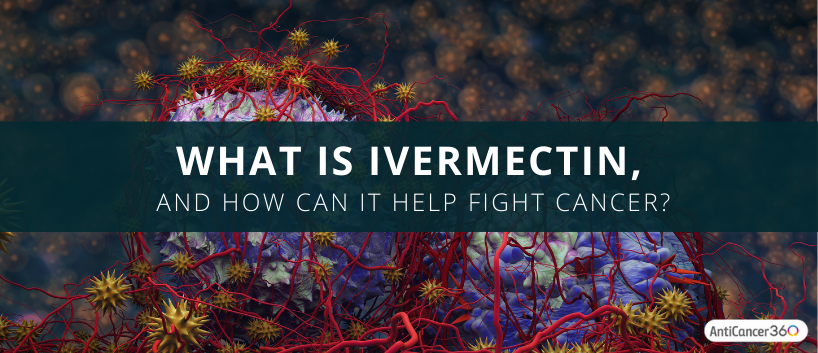



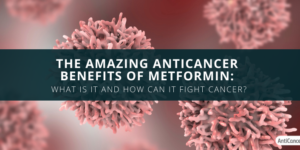


Needle Bipsy lymphome L breast
discharge, smelly, sometimes bloody..
I’m using charcoal and silver applications. not helping.
The active chemicals in arnica may reduce swelling, decrease pain, and act as antibiotics.
Do you test the discharge and then prescribe a treatment salve or *would she qualify for Ivermecting?
Her name is Danuta Staszczak she’s from Poland, I’m sending you the comment. Her English is o.k. but not practical. Please? Thank you. I’m sending you a post on FB…with a picture. she sent me that she found on your FB page.
Hi Joe Lee!
Please check your DMs – we replied to your message on Facebook 🙂